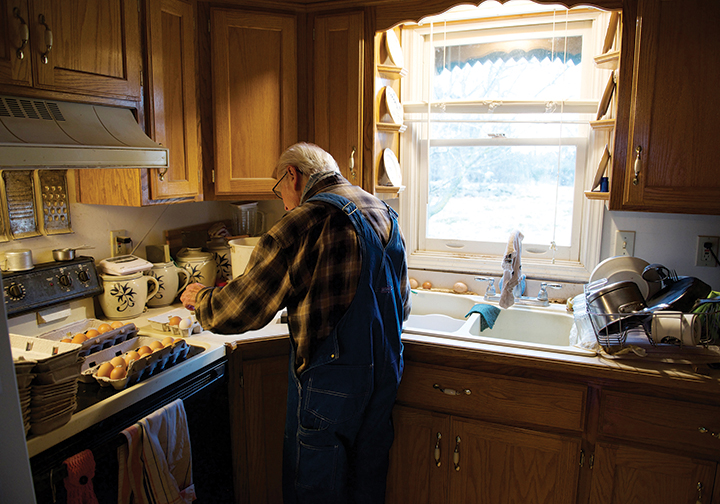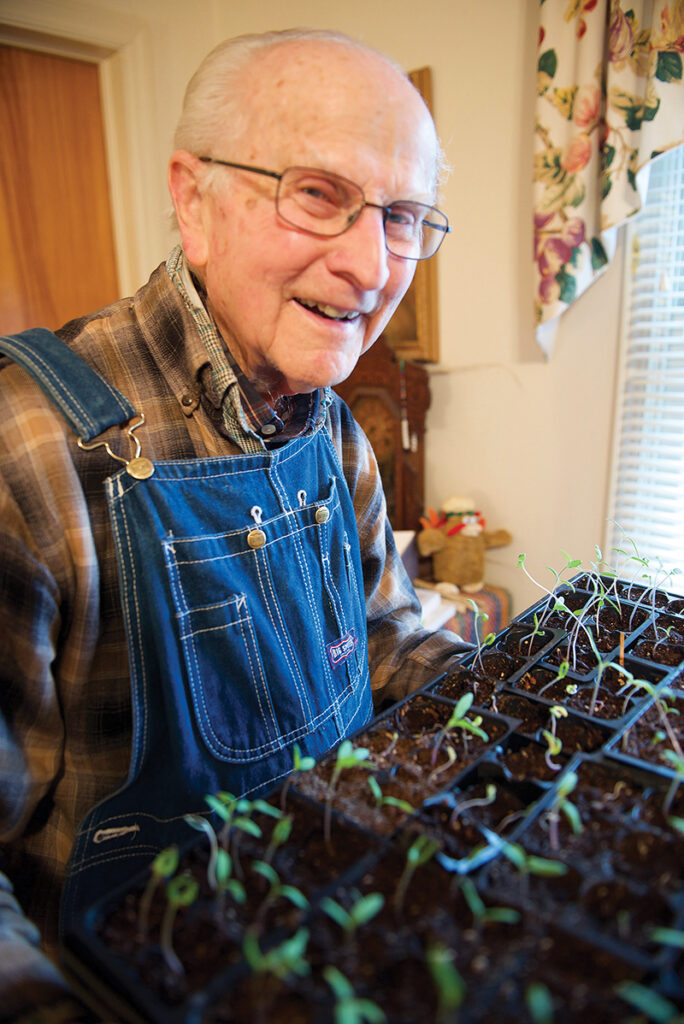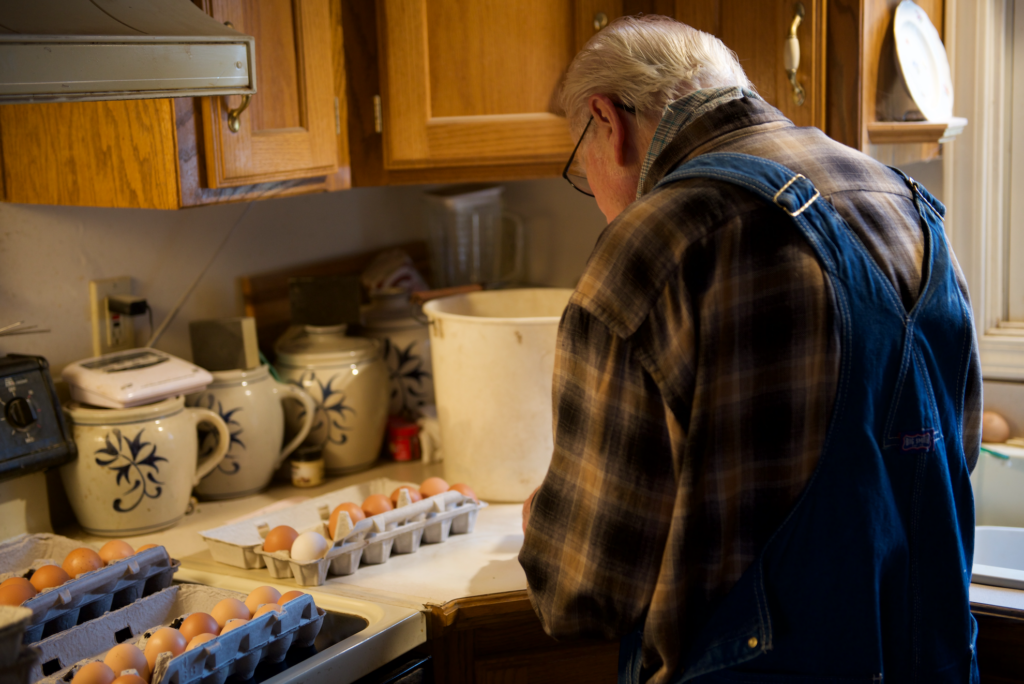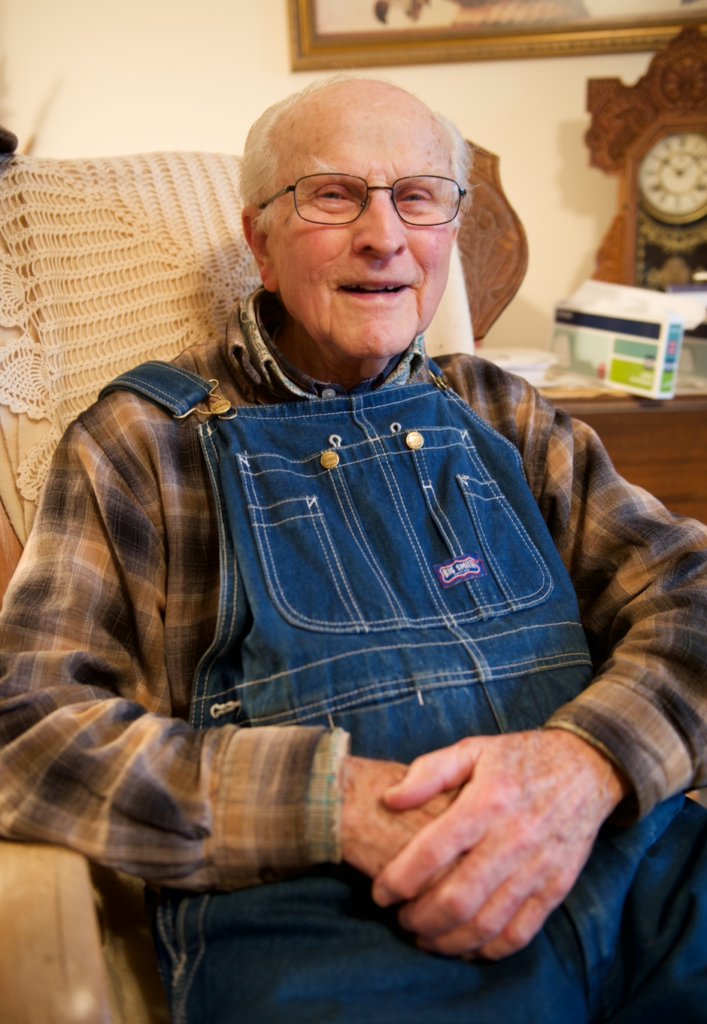
by Joe Bollig
joe.bollig@theleaven.org
KANSAS CITY, Kan. — The doorbell to the home of Father James White, SJ, is a real bell, and that tells you something about him and his life.
It’s simple, practical and old-timey. Low tech. All you do is give it a yank.
The bell was answered by the personification of your classic country bachelor grandpa farmer: balding with white hair, blue eyes smiling through glasses, wearing two layers of plaid flannel shirts and Big Smith bib overalls from Nigro’s Western Store.
“They’re very practical,” said Father Jim of the overalls.
Father Jim lives in one of the two one-story 1950s farmhouses on 20 acres in a still-rural corner of northwest Kansas City, Kansas. The land was donated to the Archdiocese of Kansas City in Kansas by the estate of Michael and Rose Sambol after Rose died in 1992, and Father Jim has lived there since 1995.
The interior is a bit cluttered, but it feels comfortable and charming. Antiques and religious art are all around. Books of Scripture and commentary fill the bookcase; two starter trays of tomato plants are clearly slated for transplant in the garden.
“A lot of things in this house are antiques,” said Father Jim, 85, with a laugh. “And I’m included!”
Many of the antiques, he said, were handed down from the maternal and paternal sides of his family, including a crucifix brought from Bohemia by a grandmother on his mother’s side.

On the living room table, which also serves as his home altar to celebrate Mass, are two metal objects recovered from his Danish Lutheran grandfather’s grave when it was moved — a black metal plaque “At Rest” and a metal flower of some sort.
Last of a breed
“I’m the only Jesuit living and working in the state of Kansas, and probably the last, too, because there aren’t many of us to go around anymore and we mostly work at schools,” said Father Jim.
The Jesuits who serve Rockhurst High School (where he used to teach) and Rockhurst College in Kansas City, Missouri, are his community. He’s been a Jesuit since 1962 and was ordained a priest in 1971.
When Father Jim was hired by the Archdiocese of Kansas City in Kansas to be minister to priests in 1995, he asked then-Archbishop James P. Keleher for a place in the country where he could make pottery and keep a vegetable garden.
You can take the boy off the farm, but you can’t take the farm out of the boy. Father Jim grew up on a Flint Hills farm northwest of St. Marys, and graduated from Wamego High School. His family belonged to Immaculate Conception Parish in St. Marys, which had been a Jesuit parish from 1848 to 1971.
“I’ve always had an affection for the land and growing things,” said Father Jim. “When I arrived here, I planted 80 oak trees, and they’ve grown well. The soil is loess. That’s a wind-blown soil from dust that blew up from the river valleys when the glaciers retreated.”

In the yard, he created a little pile of reddish stones the glaciers brought from the far north thousands of years ago.
Father Jim stopped making pottery because it strained his arms, but he has another side gig. The metal pottery building is now his feed shed, and the three other buildings on the property house his chickens. He raises chickens and sells their eggs to help support himself. The chicken breed is Red Star.
He eats a lot of chicken.
Father Jim gets help from members of the Knights of Columbus at Curé of Ars Parish in Leawood, who pick up his feed orders in Bonner Springs, deliver the feed and help sell the eggs.
So, he came by his nickname honestly: Father Egg White.

Father Jim is retired but active. He still gives spiritual direction to various priests, but he handed off his duties as minister to priests to Father Francis Hund, senior associate pastor in residence at Prince of Peace Parish in Olathe.
Since the 1990s, he has also done “supply,” or substituting at Mass for pastors. He regularly celebrates Mass on Mondays at Queen of the Holy Rosary in Overland Park and on Thursdays at St. Francis de Sales Parish in Lansing.
“I used to do a whole lot more than I do now,” he said. “Some weekends, I’d have six Masses. I don’t do anything like that anymore. I’m not as active at 85 as I was at 65, but I’m still pretty much available.”
Prayer, peace and quiet
“I was asked a couple of years ago, ‘What has been your major accomplishment in over 50 years in priesthood?’” said Father Jim.
His answer was a simple one.
“To grow in intimacy with Jesus,” he said. “You have to have peace and quiet to do that.”
It helps to have a place like his small “farm,” he said, for peace and quiet. But Father Jim also does something that helps: He eschews much technology.
He only owns a simple cellphone, mostly if something happens when he’s driving. He uses a landline at home.
He doesn’t own a computer. He doesn’t have internet connectivity. He doesn’t have cable or satellite or a television to connect them to. He doesn’t have a typewriter (which used to be very important to him), a dishwasher or a clothes dryer.
Video games?
“I don’t know what those are,” he said.

He has a CD collection of music, mostly classical, but he doesn’t listen to them anymore. Like any good farmer, he has a weather radio and a regular radio.
He’s not anti-technology. He just doesn’t need it, mostly.
“Spiritual things come to the surface more readily in peace and quiet,” said Father Jim.
While he lived at a retreat house in Liebenthal, in the Diocese of Dodge City, there was a television, but he covered it with a tablecloth. There was a computer owed by the diocese, but if he pressed one wrong button it wouldn’t work right. Someone once gave him a computer, but he lost interest.
“Here’s where the words ‘peace and quiet’ come in,” he said. “I enjoy peace and quiet. There’s no need for a television set.”
Not having the technology that most people would consider essential is not a burden for him. He can keep in touch with people with phone calls or regular mail. Other people help him when he needs it for particular things.
“Sometimes, I have a need for what other people have expertise in. That would be computers, information that comes from computers, and I have two sources. One is a lady at Rockhurst Jesuit community. She is our community coordinator, so I call her up. I also call Kelly [Kmiecek] in the archdiocesan vocation office.”
In a pinch, there’s also a neighbor lady who he turns to when he needs to quickly get homily material from an internet source. Most recently, it was an Emily Dickinson poem.
“I know Father Jim lives a simple lifestyle without a lot of distractions,” said Father Hund. “He empties himself to make room for God.
“That’s part of the Jesuit prayer, the ‘Suscipe.’ It begins, ‘Take Lord, and receive all my liberty,’ and ends with ‘give me your love and your grace, for this is enough for me.’”
Here, in the quiet of Father Jim’s house — and of his life — those final words resonate in a special way: “This is enough for me.”
“That part of the Jesuit spirituality,” said Father Hund, “is certainly lived in his life.”







Thank you for writing this article. Everything you have said about Fr Jim is spot on. I got to know him from Holy Trinity parish in Lenexa. I was a sacristan, Eucharist minister at many of his masses. I also would help him with his many coolers that held the eggs that he sold before and after mass! We are so blessed to have Fr Jim in our diocese and I am so greatful to have known him and to be able to call him my friend!
Fr. White is a breath of fresh air this world needs more of. Amen
Beautifully written! Your presentation of Fr. White is right on target. We buy eggs from him every Monday at Queen of the Holy Rosary and also attend his celebration of Mass. We have enjoyed his presence for all these years and are thankful to have him with us. The photos are amazing! Thank you!